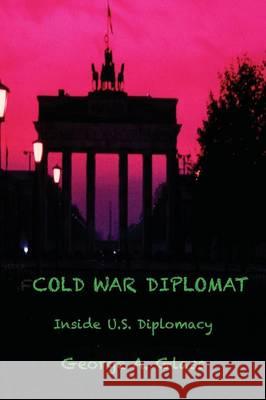Cold War Diplomat: Inside U.S. Diplomacy 1981-2011 » książka
Cold War Diplomat: Inside U.S. Diplomacy 1981-2011
ISBN-13: 9780986346316 / Angielski / Twarda / 2015 / 230 str.
What diplomats really do (illustrated): U.S. diplomat George Glass recounts adventures and conflicts from over three decades in the Foreign Service. Largely focused on the Cold War, he describes infiltration of the peace movement and anti-Americanism in West Berlin. He details dealing with Moscow dissidents before Gorbachev. He reviews his arrests by the KGB, a high-speed KGB auto chase, and the suicide of a friend. He portrays battling East German leader Erich Honecker's plots to flood Berlin with refugees and close checkpoints. He shares his views on politicians, and reflects on the "big picture" while gazing at ducklings on the National Mall. The author recounts living in Tokyo with no knowledge of Japan, but called on to address Soviet bomber incursions. With the 1989 collapse of the Berlin Wall he is yanked back to East Berlin to sort through German unification, including worries that a coup might derail history. He describes the midnight moment when East Germans voted to unify, and the diplomatic strategy to chart Germany's future. Landing in Washington days before the Bosnia Srebrenica massacre, Glass plunges into the 1995 bombing of the Bosnian Serbs, working with Richard Holbrooke, and achieving the Dayton Peace Accords. He spells out back-room drama and threats involved in forcing the Bosnian Serbs in 1997 to scrap their tanks and mortars. The author outlines duties as Consul General in Munich at the end of the millennium, and the conflicts between family and career that infect many Foreign Service careers. Glass arrives back in Washington on 9/11, walking into the State Department just as everyone is evacuating. He helps create an unprecedented effort to stop terrorist finance. Three years later he winds up in Vienna, running the U.S. Mission to the UN, dedicated to combating the Iranian nuclear threat. He details EU efforts that stopped the Iranian program for nine months, and diplomatic fistfights to isolate Iran. The author describes advising the Norad-Northcom military commander in Colorado on Russian incursions, missile defense, and terrorism. Finally, he returns to the U.S. embassy in Berlin to dissect German elections and the euro crisis, before facing Wikileaks.
What diplomats really do (illustrated): U.S. diplomat George Glass recounts adventures and conflicts from over three decades in the Foreign Service. Largely focused on the Cold War, he describes infiltration of the peace movement and anti-Americanism in West Berlin. He details dealing with Moscow dissidents before Gorbachev. He reviews his arrests by the KGB, a high-speed KGB auto chase, and the suicide of a friend. He portrays battling East German leader Erich Honecker's plots to flood Berlin with refugees and close checkpoints. He shares his views on politicians, and reflects on the "big picture" while gazing at ducklings on the National Mall. The author recounts living in Tokyo with no knowledge of Japan, but called on to address Soviet bomber incursions. With the 1989 collapse of the Berlin Wall he is yanked back to East Berlin to sort through German unification, including worries that a coup might derail history. He describes the midnight moment when East Germans voted to unify, and the diplomatic strategy to chart Germany's future. Landing in Washington days before the Bosnia Srebrenica massacre, Glass plunges into the 1995 bombing of the Bosnian Serbs, working with Richard Holbrooke, and achieving the Dayton Peace Accords. He spells out back-room drama and threats involved in forcing the Bosnian Serbs in 1997 to scrap their tanks and mortars. The author outlines duties as Consul General in Munich at the end of the millennium, and the conflicts between family and career that infect many Foreign Service careers. Glass arrives back in Washington on 9/11, walking into the State Department just as everyone is evacuating. He helps create an unprecedented effort to stop terrorist finance. Three years later he winds up in Vienna, running the U.S. Mission to the UN, dedicated to combating the Iranian nuclear threat. He details EU efforts that stopped the Iranian program for nine months, and diplomatic fistfights to isolate Iran. The author describes advising the Norad-Northcom military commander in Colorado on Russian incursions, missile defense, and terrorism. Finally, he returns to the U.S. embassy in Berlin to dissect German elections and the euro crisis, before facing Wikileaks.











